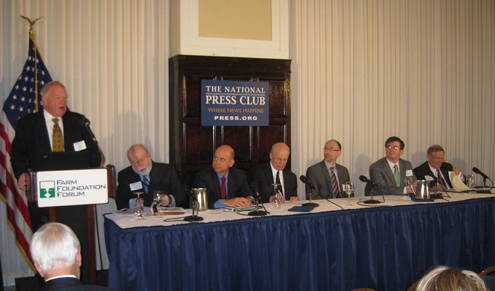WASHINGTON, Nov. 14, 2012- While the world awaits the results of U.S. negotiations to avert the “fiscal cliff,” or combination of tax hikes and spending cuts at the end of the year, rural policy leaders discussed potential farm bill outcomes at the National Press Club on Wednesday.
However, a solution to the fiscal cliff, which includes the fate of several tax provisions including the estate tax and capital gains tax, may be more important to agriculture during this lame duck session than the farm bill, said Craig Jagger, president of Legis Consulting. Jagger spoke during the Farm Foundation Forum at the National Press Club, which covered “what the 2012 election means for agriculture, food and rural policy.”
“Hopefully, it's not a status quo legislative and budget outlook in the 113th Congress,” Jagger said, reflecting on the fact that voters maintained President Barack Obama in the Oval Office, Democrats in the majority of the Senate and Republicans in control of the House. “The real 2012 election mandate is ‘red and blue need to stop fighting.’”
However, he noted that if the 112th Congress ends without passing a new farm bill, the Senate and House Agriculture Committees must at least reintroduce their bills next year and repeat the committee and floor processes, “and may need to make significant modifications.”
Jagger said that two important actions need to take place regarding farm programs during the lame duck session: the reauthorization of the authority to operate programs with baselines that expired on September 30; and the continued suspension of permanent law provisions for the 1938 and 1949 Acts.
“Whatever else happens, if we get five-year bill or not, these are two things that have to happen, in my opinion, before the end of the year,” Jagger said.
In the event of a farm bill extension, “there is serious work that needs to be done, but there’s not much talk about it,” said National Sustainable Agriculture Coalition (NSAC) Policy Director Ferd Hoefner.
Decisions regarding the length of an extension, the authorization of disaster programs, modifications for the dairy sector, funding for smaller development programs and farm subsidy reform all need to be addressed if the 2008 Farm Bill is extended, he explained.
Hoefner noted that much the concentration regarding the farm bill is on “big ticket items” like food stamps, crop insurance and the commodity title. “We forget these effects are already in place” for several expired development programs. For example, farmers on the waiting list for watershed restoration, young farmers looking for training and seniors looking for housing are all affected by farm bill programs that have already stopped.
“We need to start talking seriously about what goes into an extension bill,” he said, particularly reflecting the decision both chambers made to eliminate direct payments in the next farm bill, which adds to agriculture’s contribution to deficit reduction.
When the time comes to reconcile the House and Senate versions of farm policy, Jagger confirmed that the commodity title and the food stamp program, or Supplemental Nutrition Assistance Program (SNAP), have the greatest differences.
In the past election season, Hoefner noted an “increasing call from some Republicans to remove SNAP from the farm bill altogether.” However, he maintained that this “would head toward the end of farm bills as we know them.”
He also dismissed the idea of block granting the food stamp program to the states, “because this will inevitably lead to cuts” and would slowly make the program cyclical, rather than counter-cyclical, “meaning there will be less money there precisely when the economy and state budgets are calling for more revenue.”
Regarding post-election dynamics, both Hoefner and Eric Johnson from the National Association of Counties (NACo) described the consistent decline in Blue Dog Democrats in Congress. Johnson said the number of conservative Democrats, or Blue Dogs, decreased from 24 to 15 in this election cycle.
Johnson noted that Republicans controlled the redistricting for most House seats, “so Democrats will have a hard time,” he said. “You’ll have to have a tidal wave election for Democrats to regain control of the House in the next decade.”
Johnson also expressed concerns about post-election regulations from the Environmental Protection Agency (EPA), including the possible federalization of all waters of the United States and regulation of particulate matter, or farm dust. He explained that the Obama Administration said it would not regulate farm dust, but noted that “the final rule’s not out yet.”
He agreed with Hoefner that the expiration of funding for several Rural Development programs poses a threat to infrastructure, beginning farmer, renewable energy and other various programs. “The Senate and House bills have some great policy changes to make those programs more effective,” he said. “So we are definitely worried about a long-term extension.”

#30
For more news, go to www.agri-pulse.com
